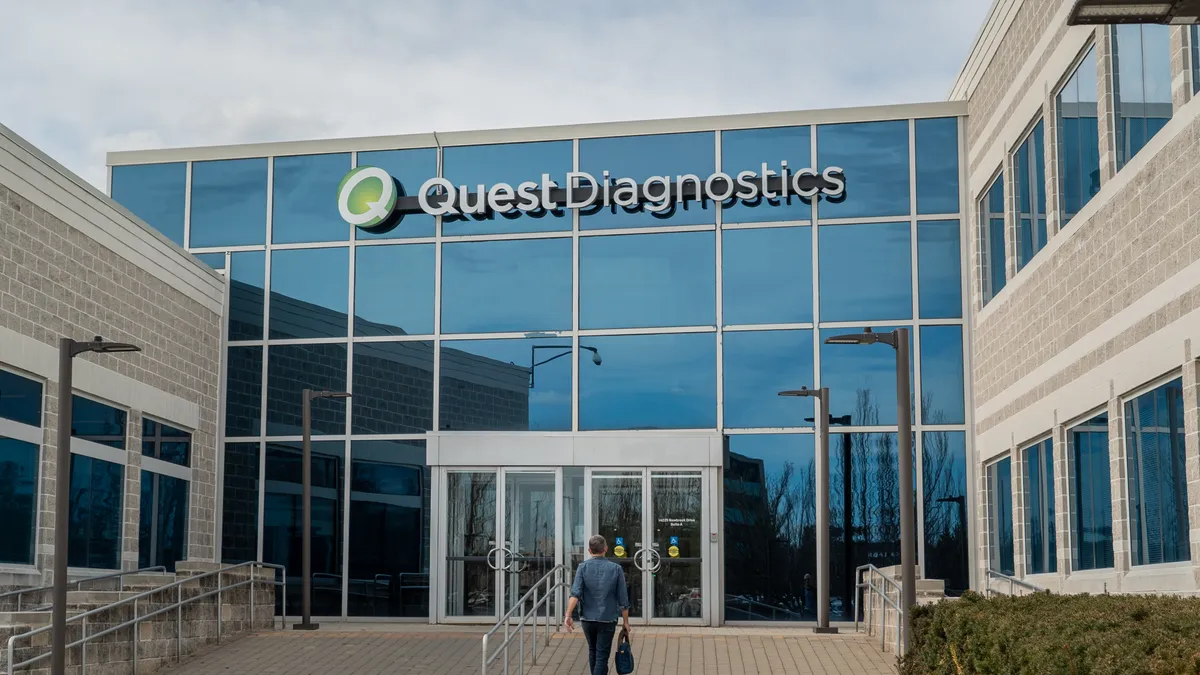Dive Brief:
-
Quest Diagnostics is forecasting "breakout" growth in direct-to-consumer testing that will create a $2 billion market by 2025, execs said at the lab giant's virtual investor day on Thursday.
-
With the COVID-19 pandemic accelerating interest in telehealth and consumer-initiated testing, Quest is expanding its existing DTC operation to try to capture $250 million of the emerging market.
-
Quest’s next move is to start selling an $89 at-home fecal immunochemical test to go after the colorectal cancer screening market dominated by Exact Sciences' Cologuard. The test is set to launch this month.
Dive Insight:
Quest set up QuestDirect in 2018 but the service came of age last year as non-coronavirus revenue doubled. Factoring in COVID-19 tests, sales increased by eight times. Quest has sold more than 30,000 tests for active COVID-19 infections and 280,000 antibody kits. A consumer-initiated insurance pay product that launched in early December is generating 1,000 orders per day.
The surge in demand for DTC testing is part of a broader shift toward telehealth and e-commerce as a result of the pandemic.
Virtual care exploded during the pandemic, with weekly visits jumping twenty-three-fold from the year prior, according to recent analysis in Health Affairs.
The surge came alongside growth in e-commerce, which gained as much market share in eight weeks as in the prior 10 years, according to Cathy Doherty, Quest's senior vice president for clinical franchises and marketing, who contends they are a start of a permanent shift.
"This market is positioned for breakout growth, and we estimate it to be about a $2 billion market by 2025 ... We are poised to capture $250 million of this opportunity," Doherty said at Thursday's investor event.
Multiple other companies are pursuing the opportunity. LabCorp, Quest's most direct rival, sells the Pixel DTC testing service and recently teamed up to sell its COVID-19 home sample collection kits at Walgreens. Smaller, more specialized companies such as Color, which raised $167 million to scale up testing and telehealth services in January, are also going after the market.
Doherty cited consumer survey data to make the case that Quest has an edge over the competition. The survey data show 26% of people name Quest when asked to list places they can go to receive lab tests. Another national lab, not named by Quest but assumedly LabCorp, is the next most frequently recalled testing provider at 16%.
Quest expects the brand recognition, which it is trying to grow with marketing strategy spanning from podcasts to Fox News, to serve it well as it competes.
The company's next step is to make the InSure ONE colorectal test available to consumers. Quest already sells the test via physicians and, like Exact Sciences has done with Cologuard, has framed the product as a potential solution to the deferrals of colonoscopies during the pandemic. Quest is also working to expand its home kit collection service and partner with retailers to open up a new sales channel.










